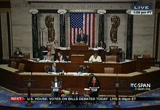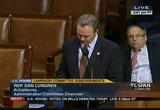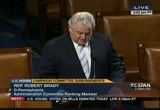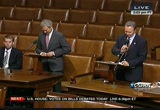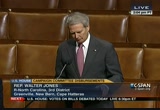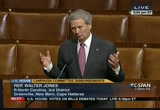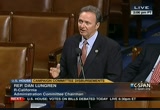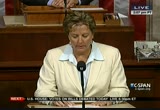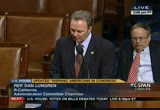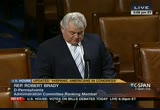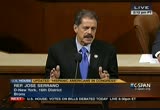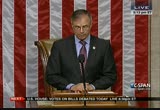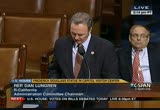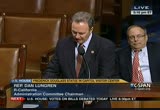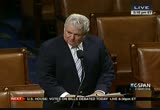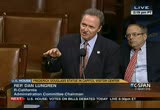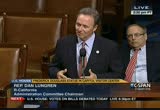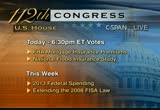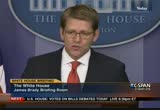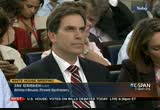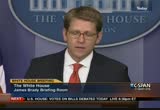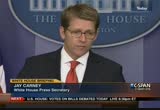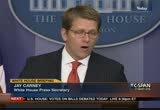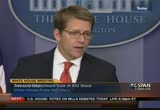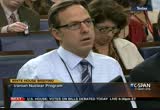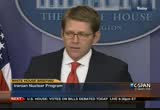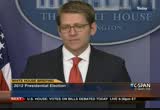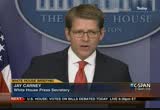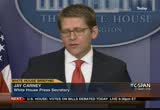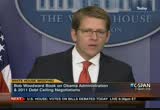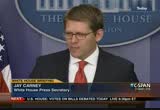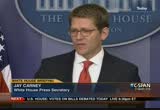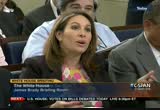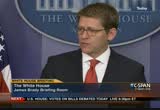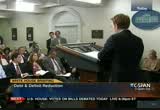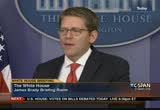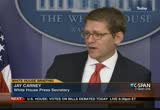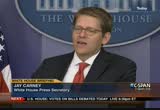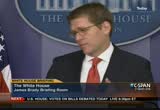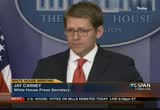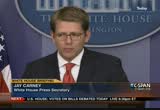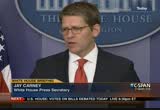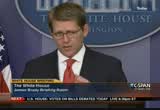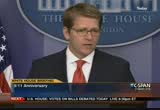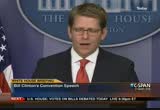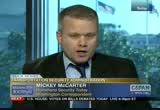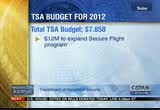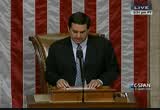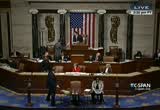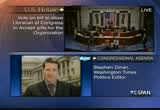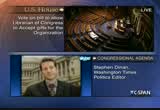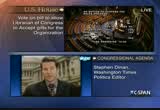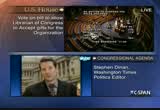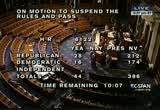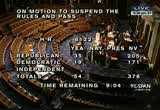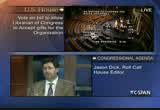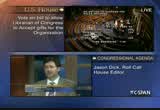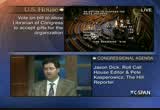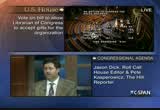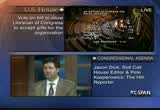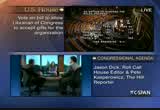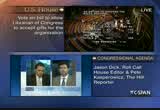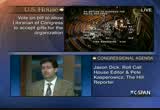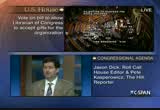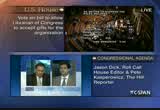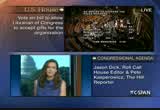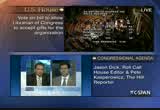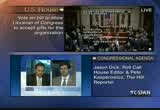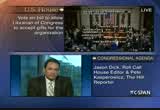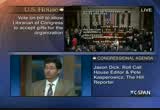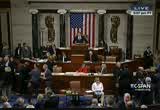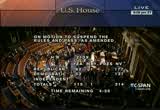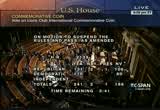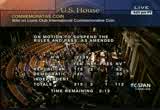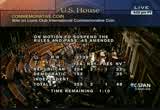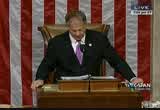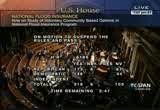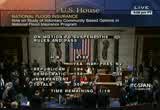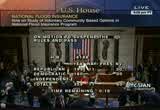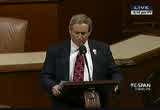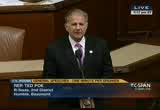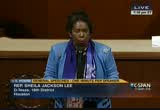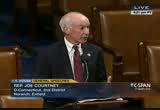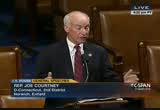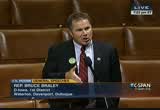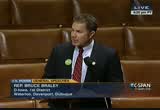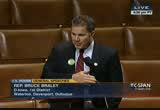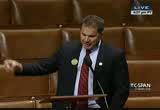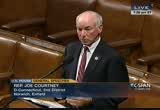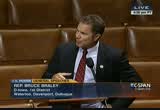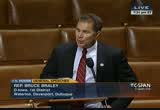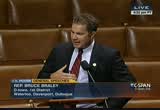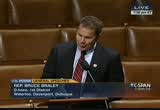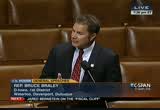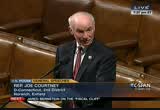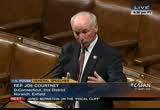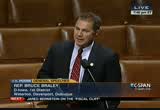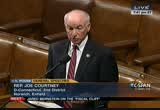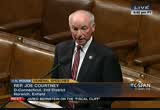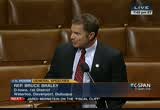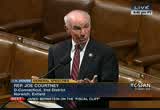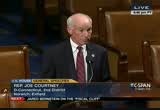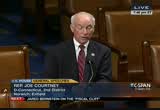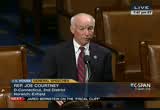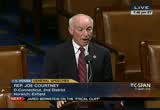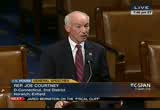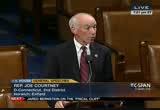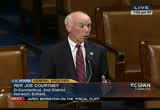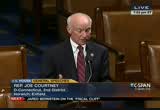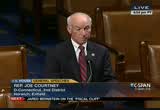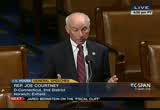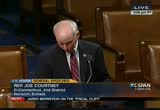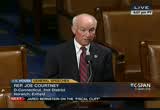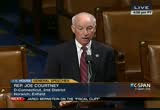tv U.S. House of Representatives CSPAN September 10, 2012 5:00pm-8:00pm EDT
5:00 pm
affirmative -- mr. lungren: on that i'd ask for the yeas and nays. the speaker pro tempore: all those in favor of taking this vote by the. -- by the yeas and nays will rise and remain standing until counted. a sufficient number having arisen, the yeas and nays are ordered. pursuant to clause 8 of rule 20 and the chair's prior announcement, further proceedings on this motion will be postponed. . for what purpose does the gentleman from california rise? mr. lungren: mr. speaker, i move to suspend the rules and pass the bill, h.r. 406. the speaker pro tempore: the clerk will report the title of the bill. the clerk: union calendar number 452, h.r. 406, a bill to amend the federal election campaign act of 1971, to permit candidates for election for federal office to designate an individual who would be authorized to disperse funds of the authorized campaign committees of the candidate in the event of the death of the candidate. mr. lungren: mr. speaker, i ask unanimous consent that all members have five legislative days to revise and extend their remarks on this bill. the speaker pro tempore: without objection.
5:01 pm
pursuant to the rule, the gentleman from california, mr. lungren, and the gentleman from pennsylvania, mr. brady, each will control 20 minutes. the chair recognizes the gentleman from california. mr. lungren: thank you very much, mr. speaker. i yield myself such time as i might consume. mr. speaker, i rise today in support of h.r. 406 this legislation was introduced by our colleague, congressman walter jones. it simply amends the federal election's campaign act of 1971 to permit candidates for election for federal office to designate an individual who would be authorized to disburse campaign funds in the event of the death of the candidate. every private citizen who decides to become a candidate for public office is driven by issues that inspire and motivate them to want to serve. often those issues outlive the individuals who champion their ideals. this this bill will ensure that every candidate can appoint a trusted individual to distribute campaign funds in the event they die. i urge my colleagues to support h.r. 406 and i would reserve the balance of my time.
5:02 pm
the speaker pro tempore: the gentleman reserves the balance of his time. the gentleman from pennsylvania is recognized. mr. brady: mr. speaker, i yield myself as much time as i may consume. the speaker pro tempore: the gentleman is recognized. mr. brady: thank you, mr. speaker. i support this bill to authorize someone to disburse his or her unspent campaign funds given the candidate's death under this bill, a candidate could designate another person by filing the appropriate form and could revoke or change the designation at any time. the bill allows the candidate to designate a second individual to carry out the duties and wishes of the candidate within the limits of the law. should the first designee die or become unable to perform these duties, it further allows candidates to provide instructions for distribution of campaign funds as allowed by law. h.r. 406 is designed to help campaign treasurers facing conflicting state laws in case a candidate dies leaving unspent balances in the campaign treasuries which happens from time to time. this measure offers a commonsense improvement to the federal election campaign act to
5:03 pm
deal with this situation. the house has passed similar legislation before and i urge our members to support it again. and i pledge to my friend that i would do whatever i can in my power to make sure the senate does take this up so we can pass it into law and i yield back the balance of my time. the speaker pro tempore: the gentleman yields back the balance of his time. the gentleman from california is recognized. mr. lungren: mr. speaker, this time i'd yield four minutes to the gentleman from north carolina, mr. jones, a distinguished member of the committee on armed services and the committee on financial serviceless. the speaker pro tempore: the gentleman from north carolina is recognized. mr. jones: thank you, mr. speaker. mr. chairman and ranking member braidy, i want to thank you all for bringing this bill back to the floor of the house. this came to my attention, i would not have had any idea that if a candidate or an incumbent running as a candidate would die in office, that they, their family would not decide how to disburse the money, it would go back to the treasurer of the campaign and in many case, many times that's probably what the
5:04 pm
family would want anyway. but what i found out with my own father who served here 26 years, and he died in office, was that it does create a problem. if the family has the authority to make the recommendation as to how to disburse the proceeds, it just makes for a very satisfactory time in a very difficult time when the family member dies. so to mr. lungren and mr. braidy, thank you very much for bringing this -- brady, thank you very much for bringing this bill to the floor of the house again. all this is is a simple change so that the candidate for federal office can determine that he would like to have or she would like to have a other person other than the treasurer to disburse the funds and if we pass this bill today, i want to ask my friend, mr. brady, to help me with the senate and i'll reach out to the republican and maybe he can reach out to the democrat and get this bill
5:05 pm
through because it's the right thing to do for the family in that tragic situation, that can happen to any of us. so, mr. chairman, i yield back the balance of my time. thank you. mr. lungren: mr. speaker, i yield myself such time as i may consume. the speaker pro tempore: the gentleman is recognized. mr. lungren: mr. speaker, i want to make it very, very clear this does not change the law that the campaign funds would have to be used for a trar channel purpose or -- charitable purpose or for a political purpose, that is to a party or candidate. it doesn't change that at all. it just changes the person who would have the decision making responsibility. and since this is a situation where a member or someone running for office would die, those funds in some cases would probably -- the candidate would wish them to go to a particular charity or series of charities. and this would ensure that those people who know bet best the candidate and know what his or
5:06 pm
her desires would be would make that determination. but it does not in any way change it so that it could be used for the personal -- used for a personal purpose by the family or anybody else designated. it would still have to go to those legitimate legal purposes for which campaign funds are limited. it would do nothing more than change the person who would make that determination and we have real-life experience of that occurring and that is why i support this very strongly. it's been supported strongly in the house before and if we can get the attention of our frenledses on the other side of the capitol, we can make this happen and i think it would be a good, good thing. so with that i would urge my colleagues to support this legislation and i would yield back the balance of my time. the speaker pro tempore: the gentleman yields back the balance of his time. the question is will the house suspend the rules and pass h.r. 406. those in favor say aye. those opposed, no. in the opinion of the chair, 2/3
5:07 pm
of those voting having responded in the affirmative, the rules are suspended, the bill is passed and without objection the motion to reconsider is laid on the table. for what purpose does the gentleman from california seek recognition? mr. lungren: mr. speaker, i move to suspend the rules and adopt house concurrent resolution 132. the speaker pro tempore: the clerk will report the title of the concurrent resolution. the clerk: house concurrent resolution 132, concurrent resolution providing funding to ensure the printing and production of the authorized number of copies of the revised and updated version of the house document entitled "hispanic americans in congress" and for other purposes. the speaker pro tempore: pursuant to the rule, the gentleman from california, mr. lungren, and the gentleman from pennsylvania, mr. brady, each will control 20 minutes. the chair recognizes the gentleman from california. mr. lungren: thank you very much, mr. speaker. i ask unanimous consent that all members have five legislative days to revise and extend their remarks. the speaker pro tempore: without objection. mr. lungren: mr. speaker, i yield myself such time as i may consume. the speaker pro tempore: the gentleman is recognized.
5:08 pm
mr. lungren: mr. speaker, i rise today in support of house concurrent resolution 132, providing funding to ensure the printing and production of an authorized number of copies of the revised and updated version of the house document entitled "hispanic americans in congress" . the previous authorization from the 107th congress did not authorize sufficient funds to make available to members the same number of copies as the previous publications of black americans in congress and women in congress. additionaly the resolution authorizes the electronic publication of "hispanic americans in congress". "women in congress" and "black americans in congress." thereby bringing us up to what is becoming more and more the way of publication, that is by electronic means. this resolution will help to ensure this valuable history will be available for future generations and i would urge my colleagues to support the resolution and reserve the balance of my time. the speaker pro tempore: the gentleman reserves the balance of his time. the gentleman from pennsylvania
5:09 pm
is recognized. mr. brady: mr. speaker, i yield myself as much time as i may consume. the speaker pro tempore: the gentleman is recognized. mr. brady: thank you, mr. speaker. i urge the house to adopt this resolution in which the chairman has accurately described. members recall that in 2001 we authorized new editions of three congressional publications. "women in congress," "black americans in congress" and "hispanic americans in congress." the new additions -- editions were distributed to the members. libraries and other 207 pursuants to their respective authorizations. however the 11 years since we authorized a new edition of "hispanic americans in congress" , circumstances have changed including i am clited to say the election of more hispanics to serve in this house than the other body. this means the n edition will be larger than estimated and the cost of the printing, the same number of copies of "hispanic americans in congress" would likely be larger. as i urge adoption of this resolution, i wish to thank the clerk who worked on the revised editions and the dedicated men
5:10 pm
and women of the government printing office who procure the volumes for their fine work. the new editions of "women in congress" and "black americans in congress" are useful, high-quality reference volumes that are great value to students, historians and us. i'm certain the edition of "hispanic americans in congress" will similarly be well received when published and distributed in the coming months. mr. chairman, i reserve the balance of my time. the speaker pro tempore: the gentleman reserves the balance of his time. the gentleman from california is recognized. mr. lungren: mr. speaker, i have no more requests for time. does the gentleman -- the gentleman has a request so i would reserve the balance of my time. the speaker pro tempore: the gentleman from california reserves. the gentleman from pennsylvania is recognized. mr. brady: thank you, mr. speaker. i'd like to recognize mr. serrano from new york, for as much time as he may consume. the speaker pro tempore: the gentleman new york is recognized. mr. serrano: thank you so much. i want to thank the chairman and the ranking member for bringing this resolution of this bill to the floor. in 2001 i sponsored the originals arelusion which created the "hispanic americans in congress" book.
5:11 pm
and to some folks watching this debate, that may not be the most important bill we will debate in a couple of days or it may be for that matter. but on the other hand, when you really think of the historic nature of this resolution and what happened in 2001, where this book became a very big item, as communities throughout the nation, in fact, members of congress received a lot of mail and phone calls at that time asking for copies and of course there were very limited amounts. now this resolution would allow for a growth in that number, but most importantly dealing with the world we deal with today, in today, that -- this resolution allows for a digital copy to be made available. now, i don't know the specific language of the bill but i would imagine that any american then can take that digital copy and make their own copy and so libraries and schools and individuals would be able to
5:12 pm
make that number grow. and it's important to know why that is an important thing to do. women in congress, african-americans in congress, hispanics in congress were simply a way for people to say, we have a lot of information about these particular communities in terms of what they've done in sports in show business, in business, but there's little information, very little that's to what has happened in congress since the beginning of time. of our republican. and so this book when it first came out, was really something than curred a lot of research and brought about a lot of discussion because people just did not know how long back there had been hispanic americans in congress. finally, with the growth of the latino leadership community, with the fact that when this first -- this book first came out, to be honest, it was really a book about this side of the aisle. now the next book will be about a wide side of the aisle because both sides -- because it has grown dramatically. and we suspect after the next election the number will grow
5:13 pm
even more dramatically. and so i thank you both for bringing this resolution up. i hope all members vote for it unanimously. and that we can get the book printed as soon as possible. thank you. the speaker pro tempore: the gentleman yields back the balance of his time. the gentleman from california is recognized. mr. lungren: mr. speaker, i have no more requests for time and if the gentleman has no more requests for time? mr. brady: no more requests for time, mr. speaker. mr. lungren: i would yield back the balance of my time. the speaker pro tempore: does the gentleman from pennsylvania yield back? mr. brady: i yield back the balance of my time. the speaker pro tempore: the gentleman yields back the balance of his time. the question is will the house suspend the rules and agree to house res. current resolution 132 -- house concurrent resolution 132. those in favor say aye. those opposed, no. in the opinion of the chair, 2/3 of those voting having responded in the affirmative, the rules are suspended, the concurrent resolution is agreed to and without objection the motion to reconsider is laid on the table. for what purpose does the gentleman from california seek recognition? mr. lungren: mr. speaker, i move to suspend the rules and pass the bill h.r. 6336 with
5:14 pm
amendments. the speaker pro tempore: the clerk will report the title of the bill. the clerk: h.r. 6336, a bill to direct the joint committee on the library to accept a sfatue depicting frederick douglass from the district of columbia and to provide for the permanent display of the statue in emancipation hall of the capitol visitor center. the speaker pro tempore: pursuant to the rule, the gentleman from california, mr. lungren, and the gentleman from pennsylvania, mr. brady, each will control 20 minutes. the chair recognizes the gentleman from california. mr. lungren: mr. speaker, i ask unanimous consent that all members have five legislative days to revise and extend their remarks. the speaker pro tempore: without objection. the gentleman is recognized. mr. lungren: thank you, mr. speaker. i yield myself such time as i may consume. the speaker pro tempore: the gentleman is recognized. mr. lungren: mr. speaker, i rise today in support of h.r. 6336, a bill that i had the privilege to introduce with my esteemed colleague, the representative from the district of columbia, mrs. holmes norton. this bill appropriately, appropriately places a statue of
5:15 pm
frederick douglass into emancipation hall in the u.s. congress. frederick douglass is a pick of toll figure in american history. he an unyielding dedication to equal rights, the abolition of slavery and the advancement of women's suffrage. in addition to a gripping personal saga, detailing his flight from slavery to freedom, frederick douglass inspired a nation through both his compelling anti-slavery writings and his rhetoric. published in 1845, his eloquent autobiography, undercut pro-slavery arguments. he challenged enslavement answered inspired individuals seeking their freedom. after the civil war he served a number of government positions and became the first african-american to receive a vote for nomination as president of the united states at the 1888 republican national convention.
5:16 pm
yes, i would repeat that, the republican national convention, he was a proud republican. . september 22 marks the 150th anniversary of president abraham lincoln signing the preliminary proclamation that paved the way for the emancipation proclamation to be signed on january 1, 1863. how fitting that a statue honoring frederick douglass, will be on display on emancipation hall. and considering the remarkable achievements of frederick douglass and his presence within the u.s. capitol will honor this constitution and serve as an endearing testimony to the struggle for freedom and equality. i'd like to thank again my colleague, the congresswoman from the district of columbia, ms. holmes norton, and i know she unfortunately couldn't be here today because i know she
5:17 pm
has a requirement to teach a class. otherwise she would be here. but i wanted to thank her for her tireless work to bring this statue to the capitol as well as our counterparts in the senate, the senate rules committee. as many know, senator schumer introduced the companion legislation in the senate. i thank my ranking member for his support in this effort. i urge my colleagues to support this measure, and i look forward to welcoming the statue of frederick douglass to emancipation hall very soon. with that i'd reserve the balance of my time. the speaker pro tempore: the gentleman reserves his time. the gentleman from pennsylvania is recognized. mr. brady: mr. speaker, i yield myself such time as i may consume. the speaker pro tempore: the gentleman is recognized. mr. brady: thank you, mr. speaker. i also urge support for h.r. 6336, to direct the joint committee on library to accept the statue of frederick douglass and display in the emancipation hall of the capitol visit senator. frederick douglass places in history -- place in history was
5:18 pm
earned with deep seeded courage and belief of equality of all human beings. a former slave, he became one of the most prominent figures of the movement to free the slaves. it reminds visitors of how far we've come and how far we still have to go. mr. speaker, i also like to thank my chairman, mr. lungren, for his patience and this is a long time coming and his respect. with that i yield back the balance of my time. and also for his cooperation. with that i yield back the balance of my time. the speaker pro tempore: the gentleman yields back the balance of his time. the gentleman from california is recognized. mr. lungren: mr. speaker, i'd yield myself such time as i may consume. in the date that i gave that i mentioned for the emancipation proclamation i unfortunately said 1963. it was 1863. one of the great things about frederick douglass is that he inspired a nation not only to --
5:19 pm
by the example of his lifetime in releasing the bounds of slavery and becoming a free man, but he was self-educated. he was a great orator, a great writer, a great inspiration to this country. there is not many people that you can talk about that can actually take credit, tremendous credit for the passage of three amendments to the u.s. constitution. 13th, 14th and 15th. there are not many people that were on the right side of history in such a tremendous way. someone who not only worked to encourage african-americans to fight in the civil war on the side of freedom but also later on to work to ensure that the message of freedom that was the promise of both our declaration of independence and our constitution was embodied
5:20 pm
specifically in the constitution by these amendments. he was a powerful man who was -- very proud of his history and proud of his place in history in terms of leading a political movement and showing that african-americans were not just freed slaves that somehow got their freedom at the suffrage of the other members of society but that they fought for, they struggled for it and they had both physical courage and intellectual power that inspired a nation to recognize the fact that we have fallen so far short of the promise of our constitution and the declaration of independence. i am afraid that too many young people today don't know the story of frederick douglass. in a small way this may help to
5:21 pm
rekindle the interest in frederick douglass so that when the young people come to this capitol, as they often do, and they look at the staff use and they say, what did he do or what did she do, people can now look proudly to the statue of frederick douglass and explain what it is he did and why his powerful legacy is still an inspiration to all of us today. so i would hope that members would unanimously support this legislation and that we would soon see frederick douglass return to the united states capitol in this way. and with that i'd yield back the balance of my time. the speaker pro tempore: the gentleman yields back the balance of his time. the question is will the house suspend the rules and pass h.r. 6336, as amended. those in favor say aye. those opposed, no. in the opinion of the chair, 2/3 of those not responding in the affirmative -- 2/3 having responded in the affirmative, the rules are suspended, the bill is agreed to and without objection the motion to reconsider is laid on the table.
5:22 pm
5:23 pm
domestic policy is the focus from the university of denver. then the audience questions. the final debate come out monday, october 22, questions will shift to foreign policy. also watch the vice-presidential candidate debate, and we will cover the control of congress, and follow our coverage at c- span, c-span radio, and online at c-span.org. >> mitt romney has criticized the teachers unit union in chicago. other topics included the two dozen 11 debt ceiling negotiations, examined in a recent book by bob woodward.
5:24 pm
this is 50 minutes. >> is it true? i see some faces who are with us on our long trip. welcome to the white house. it is good to be back. we are happy to be here for the daily briefing. i have no announcements. i will go state -- straight to your questions. >> the president's reaction to the teachers' strike in chicago, and whether he has any directions for the strike. >> i am sure he is aware of that, but i have not spoken with
5:25 pm
him about it. i can tell you more broadly that our principal concern is for the students and his concern is for the students and families who are affected by the situation, and we hope both sides are able to come together to settle this quickly in the best interest of chicago's students. beyond that i have not got a specific reaction. -- the president has as you just heard from me, has not expressed any opinion or made any assessment about this particular incident. this president has pursued an education policy that has been a notable success and a notable bipartisan success under his and
5:26 pm
the secretary of education's leadership, and he will continue to that -- to do that, because he says investing in education now pays economic dividends later. it is integral to our economic future, and that is why he has made its an important part of his domestic policy agenda. with regard to teachers in particular, he has had on the table since a year ago today proposal that includes a section that would come if implemented, if republicans would stop blocking it, put 100 dozen teachers on the job and into our classrooms. the president is focused on this issue. he does not agree with those who think that adding more teachers
5:27 pm
should not be a priority. >> tomorrow the president plans to consider the anniversary of 9/11. is he considering doing anything with governor romney? >> i have not heard that discussed. he looks forward tomorrow to the moment of silence here at the white house and in visiting the pentagon. he hopes and knows that americans across the country will take a moment to reflect upon the events of september 11, 2001, and all that our country has been through together since then. especially, i think, take a moment to remember the victims and their families from that
5:28 pm
terrible event. yes, sir. >> mr. netanyahu said that israel and the united states, there are deadlines being set for iran's nuclear program. >> we have extensive and ongoing conversations and contact with our ally israel on this issue, as well as a wide variety of other issues. we have the most comprehensive security and intelligence relationship with israel in history, as attested to not just leaders from this administration, but from the israeli government. the president's position, and acquittal e., is he is committed to preventing iran from acquiring nuclear weapons, and
5:29 pm
we shared that view with israel and with israel possibly ship in a weight that has been made clear again and again. that is why the president has pursued a policy that he has that has put together with our international partners unrelenting pressure on iran to abide by its international obligations and forsake its nuclear weapons ambitions. we believe that there remains time and space for that effort to bear fruit,, an effort that is focused on punitive sanctions, to isolate iran, and on diplomacy to bring about a change in behavior from iran. we have made clear that the window of opportunity for reaching a solution by that means will not remain open indefinitely, and as the
5:30 pm
president retains all options on the table in the pursuit of his commitment to prevent iran from acquiring a nuclear weapon. >> when the prime minister is at the u.n. general assembly, towards the end of september, will the president see him? >> i do not have scheduling updates this part in advance. >> the treasury said it will sell shares of the bailed out insurer. could you let us know about that. what are the implications of that sale for the administration, and is anything that shows that the administration is getting out of the bailout business in the election year? >> the amount you refer to are part of the ongoing efforts to exit its investment in aig and
5:31 pm
to wind down the tarp program. that is an effort that has been quite some time.' have been committed to assisting those investments as quickly as practical, but with a mind to taxpayer interest, and i think treasury has to 6, and what it demonstrates is an ongoing commitment to recover taxpayer money and -- if you look at the history here and the fact that as you know this will bring down government investment said nittany, it demonstrates again, as with the decision to say the
5:32 pm
automobile industry, decisions that were made that were politically -- but viewed by this president as absolutely necessary to ensure our economy reversed the cataclysmic slide that it was in when he took office, and that steps be taken that prevented an utter collapse of our global financial system that would have led to even more hardship and suffering by the american people here. this the six are done over at treasury, but it is safe to say that the president is pleased with the progress being made as we wind down these investments and recover tax payer money. >> following up on the subject of prime minister netanyahu. there were reports about a
5:33 pm
meeting between the u.s. ambassador and the prime minister netanyahu about -- and the prime minister expressed serious concerns about the u.s. failure to specify the red lines with iran, and with suggestions that nobody in the israeli or running in government would act, that there is no actual threat because no one believed the u.s. would do anything. can you confirm or what can you tell us about the meeting between the prime minister and the ambassador, and what do you make of skepticism that the u.s. would act if iran crossed the line because nobody knows what the line is? > the line is the president is committed to prevent iran from acquiring a nuclear weapon and he will use every tool in the arsenal of american power to
5:34 pm
achieve that goal. and he is -- >> so it's the beginning of the construction of a weapon? >> no, look, it is not fruitful, as part of this process, to engage in that kind of specificity. what we know, and i have said and many others have said, is that we have eyes into the program, we are aware of developments, and we would know if there were a so-called breakout move by iran toward the building of a nuclear weapon -- and that has not happened. there remains time, based on the information that we have and we and the israelis share back and forth, to continue to pursue the two-pronged effort here -- a diplomatic push paired with this intense pressure through punitive sanctions and other means that have isolated and pressured the regime in tehran.
5:35 pm
because ultimately, the best way to ensure that iran has given up its nuclear weapons ambitions is through a process by which the diplomatic effort works and a decision is made in tehran to give up those ambitions and to abide by in a verifiable way its united nations obligations. but the president has always made clear -- and i would dispute the characterization that people doubt his will -- the president has always made clear that he retains all options, and that he will use and have available to him all the tools of american power as necessary to deal with this very serious issue. >> just to be clear, it's not my characterization. it is reportedly prime minister netanyahu's characterization.
5:36 pm
do you have any comment on the meeting itself and reports about the meeting? >> i don't. i've seen reports about it. i believe ambassador shapiro has discussed it. >> oh, i'm sorry -- >> but i have no other information to provide to it -- about it. i can tell you what i think you already know and i've stated, and that is that this relationship has never been stronger. there has never been the level of cooperation and integration between american and israeli military and intelligence agencies. the level of support provided by this administration to israel's security needs has never been greater, and that will continue. and that has been attested to by israel's leaders, not just by those of us over here. so our commitment is clear. the president's resolve is absolute.
5:37 pm
but it is certainly the case that we need to continue to pursue the policy that we've had in place because there remains time and space to do that, and because ultimately, if pressure on iran, sanctions on iran, diplomatic isolation on iran produces a change in iranian behavior, that is the best way to ensure that iran does not acquire a nuclear weapon. >> i'm sorry if i misstated the ambassador's name. >> no, that's fine. >> but you don't -- you do or do not concede that prime minister netanyahu wishes the u.s. would be more public about the red line? >> i don't. i don't want to characterize prime minister netanyahu's position on this or other issues. what i can tell you is that we have regular consultations with the israeli leadership, including the prime minister, defense minister, other leaders, on this issue, as well as many others involving israel's security. there is no daylight between the
5:38 pm
united states and israel when it comes to what we perceive to be happening in iran with regards to its program or when it comes to the commitment to preventing iran from acquiring a nuclear weapon. let me -- i've been bad of late of not mixing it up a little bit. >> -- at the beginning of the briefing, jay. >> sorry. >> i'm just saying it always just happens to be after you're halfway through. >> you know the last few briefings i think i did the entire two rows 15 minutes into the briefing before i went to the back. >> i am all for it. >> chuck todd. >> no, no, no. i'm just saying you always want to mix it up after you start it the exact same way for the first three questions. it's just an observation. >> anybody else have a -- dan. >> i wanted to know if you -- see if you had any reaction at all to the latest poll numbers showing that the president got a little bit of a bounce coming
5:39 pm
out of the democratic national convention? and also, a reaction to the romney campaign calling this bounce a "sugar high" that will dissipate as voters go to the polls on election day? >> i'll just say a couple of things. first, those are the kinds of questions that are better answered by the campaign. but i can say, because i've heard the president say it as well as others around him, that we have always believed that this will be a very close race, and that continues to be the president's belief as well as the belief of those around him. so if that helps, in terms of our assessment of things, that's how we view it. and i think you've heard that stated by not just the president, but members of his team. >> and the fact that the romney campaign calls it a "sugar high"?
5:40 pm
>> again, i just know what we believe, which is that this is going to be a close race. it has been and will be. and the president is very focused on traveling around the country, coming out of the convention in charlotte, and traveling around the country as he did these last several days, explaining to the american people what his vision is -- what we need to do to continue moving forward to build the economy, to help it create jobs, to create greater security for the middle class -- and why, in this choice between his vision and his proposals and his opponent's, he believes his are the right ones and his opponent's are not. and it's not just, as he says, a theoretical or hypothetical conversation or comparison, because we know from recent, direct experience as a country what the results of policies
5:41 pm
like those promoted by his opponent would be -- because we'd know what they were. and they took a situation in 2001, where we had the largest surpluses -- we had large surpluses and surpluses projected to last into the future. we had a situation where eight years later, president obama was handed a greater than $1 trillion deficit, the largest in history, an economic collapse the likes of which this country hadn't experienced since the great depression, and a situation where jobs were being lost at a rate of 750,000 per month. more than 4 million jobs had been lost in the six months before he took office, another 4 plus-million would be lost in the few months after he was sworn into office. the policies being promoted by the other side are the policies
5:42 pm
that were in place leading up to the great recession. the president believes that we need to continue along with the kinds of policies that invest in education, invest in clean energy, invest in research and development, and deal with our fiscal challenges in a balanced way -- protect and build the middle class of the united states. and that's what you're hearing him talk about all around the country. >> so does the president blame republicans for the unemployment rate still above 8 percent? >> it's not about blaming. we know that the country was in economic free fall when he took office, that we were shedding jobs at an alarming rate -- 700, 750, 800,000 jobs per month. that's a fact. and that continued -- because the recession was in full bloom when he took office -- and it continued into 2009.
5:43 pm
once the president's policies -- having been enacted by congress, acted on by the president -- began to take effect, that free fall was halted. and we have been gradually pulling ourselves out of the hole created by the recession. we have been creating private- sector jobs for 30 straight months, 4.6 million private- sector jobs. we have been seeing a situation where an industry that is iconic to the american people and to the notion of america around the globe -- the american automobile industry, which was on the verge of liquidation, potentially -- was saved, restructured, and is now leading the world again. and, by outside estimates, a million jobs were saved because of that. we have a situation where manufacturing in this country, which had been in decline since
5:44 pm
the mid-1990s, has experienced a revival and more than half a million jobs have been created in manufacturing. you have a direction. when the president came into office, things were cascading downward at an alarming rate. and we have had a situation where we've been making steady progress. what the president says every time he talks about this, however, is that we are not where we need to be. we need to continue moving forward. we have a lot of work to do. we need to implement policies that help the economy grow, that protect the middle class, that don't ask seniors to shoulder the burden of the need to get our fiscal house in order. this is what this debate is all about. this is what this election is all about. and the president could not be more passionate about the choice that the american people have to make come november. yes, in the back. >> there is a case that the u.s. government recommending immunity to the former president of mexico, ernesto zedillo, last friday, against a criminal case with regard to a massacre that occurred in mexico a decade
5:45 pm
ago. do you think this will be a bad precedent for the u.s., giving immunity to people who probably are in charge of government, but there are a lot of massacres and human rights abuses? >> i'm going to have to refer you to the state department. i'm afraid demonstrating the risk of venturing beyond the front two rows, i've been asked a question to which i do not have an answer. and i will have to take it or refer you to the state department. >> ok, could you take the question, please? >> all right. thank you. donovan. >> thanks, jay. i want to ask about the new woodward book coming out. there's obviously been some excerpts out. and i think one reported by abc news said that woodward said that the president's "gaps" in leadership contributed to the failure of the grand bargain. and i wanted to get the white house feeling on that. >> well, i didn't see the report that you mention in particular. i've seen some of the assessments. i can tell you a couple of things. we, here on this side of it,
5:46 pm
who experienced and lived through the debt ceiling negotiations, those of you who covered it i think understand this well. the president had a number of priorities. first, he was absolutely committed as commander-in-chief to preventing a default by the united states, for the first time in its history, on its obligations -- a default which would have led to serious economic consequences both in this country and around the world; a default which, sadly, some elements in congress, republicans in particular -- i mean, all republicans, notably in the house of representatives -- seems to relish the prospect of coming about. so there is no question that the president during those negotiations had to be the responsible party and ensure that however they ended, they prevented default.
5:47 pm
second, he pursued a grand bargain with speaker boehner, because he believed it was in the best interest of the united states, best interest of the american people. and he demonstrated again and again through that process that he was willing to compromise to make really tough choices and decisions, to ask of his party to come with him -- that they come with him and join him in making compromises. and, unfortunately, throughout that process, whenever the possibility of a grand bargain seemed in the offing, a grand bargain that had to be balanced in nature -- because every bipartisan group that looked at this and every reasonable economist who looked at this agreed that a solution had to be balanced in nature. it had to include cuts in domestic spending, it had to include reforms in entitlement programs, and it had to include revenues. every time that became a possibility, house republicans walked away.
5:48 pm
i mean, don't forget this is a party where every one of its would-be presidents stood on a stage and said they would not accept a deal, a grand bargain, that included $1 in revenue for millionaires and billionaires -- just $1 for every $10 in cuts, which is a ratio that is preposterous on its face. so the president fought hard for a grand bargain. in the end, the speaker of the house, i think -- while the president believes that he also wanted one -- the speaker looked over his shoulder and found that there was nobody behind him in his caucus willing to make the compromises necessary. and what resulted was the budget control act that did two things: locked in cuts that had already been agreed to, committed congress to finding another $1.2 trillion, i believe, in reductions, and ensured that we did not have the
5:49 pm
kind of game of chicken with our debt ceiling that we had engaged in last summer that caused enormous economic damage even though default never came about. the president's leadership on that was, from my perspective, significant. and his commitment to trying to find a reasonable compromise was both sincere and deliberate. in the end, unfortunately, the republican position was -- as it continues to be -- which is that they would rather see dramatic cuts in national defense, dramatic cuts in research, innovation, education, infrastructure, border security. they would rather see all of that than ask millionaires and billionaires to go back to the marginal income rate that they had under bill clinton, when, by the way, the economy created 23 million jobs. it grew at a pace that we hadn't seen in half a century.
5:50 pm
the middle class got stronger, and millionaires and billionaires were coined regularly. so that's the choice that we -- i mean, that's the conflict that existed last summer, and unfortunately, it continues to be the source of our fundamental disagreement now. and that's very much a part of the discussion that we're having in this election. nancy. >> following up on that, woodward in his book also talks about how he believes the president lacked the "stamina" in turning personal relationships with congressional leaders into action, and says he talked to a lot of congressional leaders on both sides of the aisle who felt that the president hadn't done the work socially to develop relationships either through events here at the white house or outside of the white house, and so he didn't have those relationships to draw upon when this went downhill.
5:51 pm
does the president regret that he hasn't spent more time socially with leaders of congress to develop those relationships? >> it's a funny conclusion to reach given how many hours the president spent with the leaders of congress of both parties in these negotiations, including sitting on his patio, including playing golf, including at the residence. >> but he's only played golf once with -- >> the issue here isn't did john boehner and president -- did speaker boehner and president obama get along, because they did, and they do. and it is a fallacy -- and i look at some of the faces here i know who have been covering this for a while -- to suggest that it was the personal chemistry between bill clinton and newt gingrich that allowed for the balanced budgets to be created in the 1990s. don't forget, speaker gingrich presided over a house of
5:52 pm
representatives that impeached the former president. so what is required here is a willingness to accept the simple proposition that in our system of government, and in a specific condition when we have the republicans in control -- largely in control in congress, and definitely in control in the house of representatives, and the democrats here at the white house and in the senate, that not everybody is going to -- you can't get everything you want. you cannot stand on your maximalist position and just hold your breath. and what we experienced and what we continue to experience is the adamant refusal of republicans, led by house republicans, to accept that millionaires and billionaires ought to be part of the deal; that in order to protect the middle class from having their taxes going up, to protect seniors from having to
5:53 pm
live in a world where medicare comes in a voucher and their costs skyrocket, millionaires and billionaires need to pay a little bit more. oil and gas companies need to give up their subsidies. and that's just a fundamental difference in view that until republicans in the house, in particular, but also in the senate, accept the wisdom of the vast majority of the american people, of the bipartisan commissions that have looked at this, there's going to be a conflict. >> speaker boehner doesn't seem to have the same view of this good relationship. he said before, it seems like we're on different planets. he said, we're not particularly close; we go a while without speaking. they've gone to play golf once. do you think more could have been done to nurture that relationship -- >> i would just refer you to the answer i just gave you, which is that it is simply -- again, i'm not sure what magical
5:54 pm
past people are invoking where they imagine that in any recent time, serious accomplishments were achieved in policy matters at a dinner in georgetown. it doesn't happen. and what has to happen is that leaders have to be willing on behalf of all of the american people to compromise and take risk, and not to worry about whether they're going to get a challenge from the tea party in their next congressional primary, but worry about whether or not they're going to do the right thing by the american people and the american economy. >> and on jobs, the president said in his convention speech, and i think you said it today, that if congress would pass his jobs plan that you could create another million jobs. but that jobs plan is paid for by raising taxes on wealthy americans, something that was always going to be a non- starter with republicans -- >> you just stated the problem,
5:55 pm
that on every issue that could be resolved here, the adamant refusal of republicans to accept the simple proposition that millionaires and billionaires ought to be able to pay a little bit more, that we can go back to the tax rates that were in place when this country had an exceptionally strong economy and millionaires and billionaires did very well indeed -- as long as that remains the red line for the republicans we have a conflict. >> i understand that. but you introduced it a year ago; it's gone nowhere; it didn't make it through the senate. why not go back to the bargaining table and try to figure out another way to pay for it that you could get some traction on? >> here's the thing. the president has demonstrated again and again his willingness to make tough choices. there are a trillion dollars in cuts in law now that represent cuts in programs that in many cases democrats would not like
5:56 pm
to see cut. as the president said, it is simply a fact that because of the fiscal situation we're in it was necessary to make those cuts. and the president has been, was, and continues to be willing to do more in terms of spending reductions, but there has to be a concurrent willingness on the republican side to make some compromises, too. i mean, we can relive last summer today, this afternoon if you want. but that was and continues to be the fundamental obstacle to putting in place a plan that would cut our deficits by $4 trillion and make huge progress towards getting our fiscal house in order. and again, if the entire universe of people who look at this is made up of a vast
5:57 pm
majority who see it as necessary to approach it in a balanced way, so that middle- class americans don't get left holding the bag, so that seniors don't get left holding the bag, all because one segment of the leadership or of the republican party in congress insists that millionaires and billionaires should remain unharmed, that's simply -- just because you hold your breath doesn't mean you should get your way. >> i'm just saying that if it's so important that the president is going to mention it in his convention speech -- >> here's the thing. so the idea is it's so important that he should say, you know what, because republicans refuse to do the right thing, guess what, middle-class america, you pay the bill. your taxes are going to go up so that a millionaire's doesn't have to. or if you're a senior you should pay more directly out of pocket for your medicare because there's a faction in
5:58 pm
congress that simply will not ask warren buffett to pay a little more in taxes. the president is not going to accept that. he's just not. chuck, and then sorry, then i owe you, wendell. >> one -- considering arne duncan, secretary of education, his history with chicago -- obviously the president is from there -- should we expect them to have sort of some public -- to weigh in publicly on what's going on? >> i think it's our view that the sides in this dispute in chicago can and should work it out. i don't -- >> is there a point where you might step in? >> well, i don't want to speculate on that. i haven't had that discussion with either secretary duncan or the president. i think that we believe that both sides ought to -- and we hope they do -- resolve this in a way that recognizes that it is the interest of chicago's children that must be preeminent as they work it out. but i don't have any
5:59 pm
predictions for where it's going to go. we just simply hope that it gets resolved. >> is it fair to characterize the white house as sort of neutral in this dispute? >> well, we certainly haven't expressed an opinion on how it should be resolved. we're urging the sides to resolve it. >> this has been -- there are some reports that there were some chicagoans that have brought this to the president's attention, this coming showdown before. can you talk -- >> not that i'm aware of. i mean, i'm not with him every moment of the day, but i -- not in my presence, but i don't know. >> i know the president keeps saying $4 trillion. does he still have a $4 trillion plan? >> yes. >> or does that already count as -- is there $4 trillion in new deficit reduction that he's calling for? >> no. it's not ok for republicans to say, well, thanks for the million out of the four, we'll pocket it and let's start again so that we don't have to -- >> so you count what's already been agreed upon? >> the trillion dollars -- >> that plan he's got is an additional $2 trillion? is that the better way to characterize it? >> no, it's $3 trillion. the total is $4 trillion. so the trillion dollars that
6:00 pm
have already been signed into law -- the budget control act includes, as part of the super committee and sequester, another $1.2 trillion. then there's revenue, and then there's savings on interest and other things that bring it to $4 trillion-plus. that is the president's proposal. it's been the president's proposal for quite some time. it was reflected again in the budget that we put forward earlier this year. and that -- again, within the context of the big plans that have been presented, whether it's the ryan budget or simpson-bowles or rivlin- domenici, the $4 trillion figure has been sort of a magic number. >> but you've already used -- what you're saying -- but you're counting a trillion already? >> well, because they were cuts that were negotiated -- >> -- this is a $3 trillion -- how would you -- if we were doing math -- >> the plan was a $4 trillion plan, of which $1 trillion in cuts, just cuts has been enacted. and again, that $4 trillion figure reflects in rough
6:01 pm
figures what simpson-bowles was looking at, and rivlin-domenici and others, as what was necessary to begin to get our fiscal house in order. and that's why the president had a plan that reflected that. and remember, it was built on the principles of his fiscal commission, the principles that some folks celebrate without knowing what they're talking about, because simpson-bowles not just -- not only did simpson-bowles include revenue, it includes substantially more revenue the president has asked for and put in his plan. not only did it include defense cuts, it included significantly deeper defense cuts than the president believes are prudent and wise and therefore his proposals have less reduction in defense spending. so when you hear republicans try to get through a discussion in a roundtable or something and
6:02 pm
cite the merits of simpson- bowles, and then you ask them, well, do you actually support eliminating carried interest? do you support revenues the size that simpson-bowles put on the table? do you support not just all of the provisions, but maybe any of the provisions in simpson- bowles? it turns out the answer is no -- which is why, by the way, the leading house republican on simpson-bowles voted no -- paul ryan. >> when are we expecting the sequester recommendations? i know that the president -- >> end of the week. >> end of the week? >> by the end of the week is what i think i said on friday or saturday. >> and finally, who does get the presidential daily briefing if he's not there? i saw this -- >> i saw that report. it is hilarious to me -- >> -- if he's not there? >> he gets it every day, ok? the president of the united states gets the presidential daily briefing every day. there is a document that he reads every day when he is not -- well, he always reads it every day because he's a voracious consumer of all of his briefing materials. and when he is physically here,
6:03 pm
most days he has a meeting in his office, the oval one -- with participans -- participants in -- his national security team, including obviously tom donilon and others. he also has regular meetings with -- >> this is about the physical briefing from whoever is giving it versus the written briefing? >> this was a case of -- i don't know how far i want to go here, but i believe if you compare our foreign policy record with the one that preceded this one, we're comfortable with that comparison. and this president is very much steeped in the details of national security issues and the information that as president he received -- >> do you believe this report was misleading -- >> i believe the article written about it was amusing.
6:04 pm
wendell. >> you owe me a couple. >> i owe you a couple or a coffee? >> a couple. >> a coffee, too. >> as we chase this new book by mr. woodward -- >> i don't think you have to chase it. you can probably buy it. i am sure he wants you to buy it. >> he asserts that the idea for a sequestration came out of the white house, if not from the president himself. can you confirm that? >> i love this, too. the president pushed as hard as he could for a grand bargain to be balanced to include revenues, and then for a sequester to include revenues. why doesn't it include revenues? i'll ask you. why do you think it doesn't include revenues? because john boehner, eric cantor, mitch mcconnell, paul ryan adamantly refuse to ask
6:05 pm
oil and gas companies, billionaires, millionaires to contribute a dime to the cause of getting our fiscal house in order. so the sequester, as it exists, reflects not the president's principles, but the insistence by republicans that no revenue be included in it -- which again, goes back to the fundamental conflict that they would rather have deep cuts in the military budget, they would rather have deep cuts in education, in border patrol, in innovation, in infrastructure, and we know in medicare, than accept the idea that everyone ought to do their fair share. and let's not forget, as i'm sure none of us could ever -- that the budget control act was not just passed with majorities of both parties in both houses;
6:06 pm
it was celebrated as a victory by republicans, including house republicans -- including notable house republicans -- at the time. there seems a bit of revisionism because of the way that it's being presented now as a political argument -- there seems to be a bit of revisionism in it, and it has produced what i saw yesterday watching or hearing about the sunday shows, a bit of conflict at the top over exactly what was right and what was wrong when republicans overwhelmingly supported the budget control act back last summer. >> so the idea of the sequester may have come out of the white house, but the nature of the sequester you say goes to republicans? >> i don't know where the idea came out of. there have been sequesters. i think in gramm-rudman there was a sequester. the idea of a forcing mechanism -- i think everybody in the process, when there wasn't a
6:07 pm
grand bargain to be achieved because of the republicans refusal to accept balance, the idea of a forcing mechanism was agreed upon. and then it was a question of what would be contained within that forcing mechanism. the president pushed very hard, in the name of common sense and fairness, for balance, just as he had when he was trying to negotiate a grand bargain. republicans, in the name of ideology, insisted on a lack of balance, and what we have is a sequester -- which, by the way, nobody wants to see become law because it was designed specifically to be so onerous that congress would actually do something, choosing compromise and hard decision-making over the onerous cuts contained within the sequester -- we have a situation where the sequester includes only cuts in defense and non-defense discretionary
6:08 pm
spending. >> in part, because of the apparent inability to get past that, the world economic forum is now ranking the u.s. 7th in global competitiveness. we're down from 5th i think it was, and that's down from 4th. we're going in the wrong direction. what's your reaction to that? >> i wasn't aware of it, but i think there is a simple solution and it's called compromise, and it's called a willingness to accept that we have to have a balanced approach to our fiscal challenges. that's a proposition that i think is broadly accepted beyond the ideological partisan realms inhabited largely on capitol hill by members of the republican party. because what we saw -- remember -- i'll take you back 13, 14 months ago -- is that even then, during when this debate was happening, there were polls showing that a majority of republicans supported balance -- a majority of republicans
6:09 pm
and huge majorities of independents and democrats supported the idea that a grand bargain, that a plan to get our fiscal house in order should include the three legs on the stool -- of the stool -- spending cuts, entitlement reforms that strengthen the programs, and revenues. i guess some folks on the hill like their stools with only two legs. they don't stand too well. andrei. >> thank you, jay. on 9/11, i wanted to run by you an idea i heard about in some american strategies about 9/11. the idea was that without the northern distribution network for afghanistan, the strike on osama bin laden may not have
6:10 pm
happened because of the obvious implications for pakistani relations. so i guess my question for you is, to the best of your knowledge, was ndn as important as all that in the equation? >> i really -- i couldn't say. i wouldn't be able to make that assessment. i haven't looked at it. i think i would refer you to the pentagon and elsewhere for that assessment. i think if you're getting at the value of being able to provide material and equipment to our troops in afghanistan from the north, it's very important -- there's no question it is. and the assistance we've received in achieving that has been very important, as we've noted repeatedly, as part of the u.s.-russian relationship. but in terms of that, i'm not
6:11 pm
sure that i'm the right person to ask that kind of technical question. >> i'm in this briefing, so i'm asking you. >> well, as others have discovered, sometimes i don't have the answers. >> have you ever heard the president describe, like in a personal way, his memories about 9/11 -- >> i have. >> where he was, what it meant for him? >> well, i think he's spoken about this a number of times. my understanding is he was in a building in chicago that was evacuated and he was driving -- he's written about this and discussed it -- but he was in chicago, and i've heard him talk about leaving the building and getting in his car. but my memories of his accounts are probably not entirely reliable, so i would point you to what he's said on the record about it. >> do you want the memories of that day to live on, or basically for the people to get
6:12 pm
back to normal, sort of? >> i don't think it's -- i think it's important to remember. i think most people probably can't forget. ann and i remember where we were. we were on air force one on 9/11 as reporters. but the nature of, think, this country and our people is that we remember the tragedy, we remember those we lost, we keep in our hearts their families, but we rebuild and we move forward. as the president said in his speech last week, a new tower is rising over the skyline in manhattan. and i think that's testament to the kind of people that we have here. but we don't forget either. julianna.
6:13 pm
>> the clinton global initiative announced today that in addition to president obama, that governor romney would be addressing its meeting at the end of the month. do you think that that undercuts any of the arguments that president clinton was making against governor romney last week? >> no. well, i have no idea what any of the other participants are going to say at that forum, but i would simply point you to the speech that president clinton gave, which i think tells you all you need to know about his views of the president's agenda and his vision for moving forward, versus his opponent's. so the answer i think is categorically no. i mean, it's a little hard to get the bank shot that's being played here when republicans embrace president clinton and say he gave a great speech but don't want you to actually know what was in it because what was
6:14 pm
in it was as clear and comprehensive an assessment of the various proposals as you could ask for. and i don't think it was one that reflected well on the idea that we ought to go back to the policies that we had that led to the recession, that produced the biggest deficits in history, that created a situation where the middle class -- which was already under stress -- suffered mightily, and then take those policies, double down and ask seniors to accept a voucher instead of medicare. i didn't hear any endorsements on that. >> also, the end of this week marks the four-year anniversary of the collapse of lehman brothers. will the president be doing anything to mark that date? and also, does he think now, four years later, that wall street has learned its lesson? >> i'm not aware and don't believe he'll be doing anything to mark that date in particular. i think that using an adage
6:15 pm
applied in a different circumstance, the president believes that -- well, i won't use the adage, but i think that our financial sector is incredibly important to our economy. there is no question about it. that's why it was essential to the cause of getting the collapse under control and reversing it that we take the steps as a country that we did to stabilize the situation in our financial sector. it was absolutely just as important to push through wall street reform to ensure that the kinds of things that led to the great recession, that led to the near collapse of our financial markets, could not happen again, and that taxpayers would not be on the hook when institutions failed. and that's why he fought so hard to pass wall street reform, and
6:16 pm
why he is fighting so hard to keep it, against an all-out assault by those who believe that it's the right policy to undo wall street reform, let wall street write its own rules again, and hope that it turns out different. he certainly doesn't agree with that. >> thanks, jay. >> thanks all. i appreciate it. >> thanks, jay. [captions copyright national cable satellite corp. 2012] [captioning performed by national captioning institute] >> the house is coming back in in about 15 minutes. until then, a discussion of the
6:17 pm
set -- of the transportation industry. host: during us is mickey mccarter. we're talking about the transportation security administration. give us the view of its mission. guest: tsa guards u.s. airports, and there are about 435 of those airports where screeners are stationed. they are the most public face of the department of homeland security. everybody in iraq's with them when they take a flight. -- everybody interacts with them when they take a fight.
6:18 pm
they have been getting away from the guard mentality, trying to be an agency that is a proactive instead of reactive. they are standing their behavior detection program, where they can spot suspicious behavior, and they are trying to be -the air marshals as well. host: what is significant about its place under dhs? guest: it has been reorganizing itself a little bit. again, the most public example of this is the screeners are allowed to unionize after a lot of resistance, after dhs once said they do not want you to unionize because it might pose a risk to national security if they cannot deploy quickly, or if they squabble about where
6:19 pm
they need to be at a specific time. they are realizing the ways to bring training in, uniformity in, and make the agency a lot more functioning on an even keel. host: the washington correspondent for "homeland security today. -- today." how many people work for tsa and what is the range of jobs they do? we picture at the screeners. is there more to it than that? guest: are 45,000 screeners. 55,000 in total. tsa, and a screeners are the bulk of that workforce. there are four separate -- 4000 air marshals, a couple hundred people trained as behavior
6:20 pm
detection folks, a couple hundred trained as inspectors. there are several pockets of hundreds of employees in several different spots. but the screener is the bulk of the agency. host: how uniform is the level of screening? how similar is what you experience at an airport in denver, in houston, to anchorage? guest: in theory is to be the same, but as we know, there have been a lot of lapses. there is a famous case in florida recently, a case in honolulu, where screeners were found to be laying down on the job, literally sometimes, and a lot of them got fired for that. others got reprimanded, including all the way up to a federal security director. in theory, they are supposed be more uniform and screening everything equally, passengers
6:21 pm
and luggage, but sometimes that does not happen. host: the total tsa budget for to doesn't 12, we're looking at 7.8 $5 billion -- for two dozen top, 7.8 $5 billion. $275 million for baggage screening equipment. and then to mid $36 million for behavior detection officers. let's talk about the behavior detection officers. guest: they are scattered a run the airport, looking for people who look suspicious. they are trained in the concept that if you are sweating or acting erratically, you may be up to no good. host: in plain clothes? guest: they are, and they come a
6:22 pm
lot of criticism. there's the scientific basis that these officers would find somebody who is trying to do harm. the success rate in spotting a terrorist is really low. tsa has pointed to a case or two in the past, but for the most part they are responsible for getting illegal aliens, which may be important work, but not in line with their character terrorism mission. -- with their counter-terrorism missions. host: how do they differentiate between a nervous flyer and someone up to no good? guest: that has come under criticism. i have been able to see operations in the d.c. area, and that is my specialty, to look at how the mechanics of the agency function and how the money they're given is spent.
6:23 pm
getting back to the behavior detection officers, some people have said they are not looking for the right things and somebody who is committed to a terrorist act would have this steely gaze, that they're committed and focus, and critics have said that perhaps they are looking for the wrong things. host: let's get to the phones. hi. caller: are you doing? tsas curious, why isn't hiring veterans coming back from the war, because they have experience in all this? you know, they should be the ones that have the jobs first. they have been through it. they know what is going on. and they are coming home with no jobs, no nothing. tsa should be hiring our
6:24 pm
veterans. they know which way they do things. guest: the caller has a great point. use the experience cannot put it to use, and tsa would be the first to say could be doing better in employing veterans. i do not know if every year is hitting its target of a veteran hikers, but yes, that seems like a note-brainer. somebody who has experience in dealing with explosives or erratic behavior or a dangerous situation which make a great tso, transportation screening officer. host: how much of screeners are corporate contractors, versus public workers? guest: there is a move among
6:25 pm
republicans in congress to privatize tsa and airport security and have contracting companies provide for the airports, much as they did before 9/11. democrats generally decry that and say before 9/11 we allow terrorists with box cutters to get on airplanes, and now we say we live in a different environment. just recently, john micah of florida fought for and won for contractors to become screeners at airports. since that law passed, orlando and san francisco have gotten cleared to hire private contractors instead of using federal screeners. it will be interesting to see how that shakes out. studies have shown that one has not been more effective than the other. there is a perception among the public that the private contractors tend to be nicer,
6:26 pm
maybe, just anecdotally. host: here as one take. guest: that is an interesting observation. i have gone into san francisco since the change, and that is an interesting observation. i would like to report from that. host: let's hear from john in wisconsin. caller: i want to make sure you're not on the payroll of dhs or tsa? guest: no, sir, i work for an independent publishing company. caller: they have scores of journalists they buy, but let's get to the meat of the matter. dhs was set up by the former head of the east german stasi. tsa, they are not sworn officers. the private security --
6:27 pm
they have never caught a terrorist. we have spent billions on that. number three, the real place we got to worry about, the people servicing the planes and putting luggage. there is virtually no security for those people. they're not examine it very carefully. tsa is a fraud. it is theater. it should be abolished and security should be handed back to the airlines where it belongs. guest: caller raises some valid points, and there are organizations here in town by the cato institute that says get rid of tsa. they have never caught a terrorist and although tsa has pointed to cases where they have spotted a potential terrorist activity. there are lapses. somebody gets past security, somebody can link luggage who should not be handling luggage.
6:28 pm
their criticisms on both sides. there are proponents for tsa. host: issue of baggage screeners. he taught e -- he talked about luggage handlers. --st: you have to be a havets you have to be a trained tso. biggest technology program and the next year or two will be their explosive detection system for checked baggage. those systems are at the end of their life, and tsa will spend a lot of money upgrading those. host: tell us about the administrator. what is his background and what does he oversee and do? guest: john pistol was director of the fbi before he became the
6:29 pm
administrator. the tsa and mr. was a vacant position. there was an act did -- activity in there. it took them a while. when they got somebody in there, mr. pistol, everybody agreed he was a great man for the job, and he has made his goal to try to make tsa smarter. as a man who came on board at the fbi and saw the intelligence world grow after 9/11, he wanted to do the same with tsa and have them be a little bit leaner, smarter, and a manifestation of that is the new trust it traveler initiative. if you file on time and they know your history, you're not a terrorist, the odds are. they're using common sense in applying a trusted traveler system so they can focus their resources of people they know
6:30 pm
less about. host: the head of the tsa made a comment last month, talking about the type of terrorist threat that concerns him the most. [viceo clip] >> the concern is not so much we know who are on the watch list -- >> you can see the rest of this act c-span.org. the title. the clerk: report to accompany house resolution 773, resolution providing for consideration of the bill h r. 5544, to authorize and expedite a land exchange involving a national forest system of land in the district of the superior national forest and certain other forest system land in the constituent of minnesota that has limited recreational and conservational resources and land owned by the state of minnesota in trust for the public school system that are largely scattered in checker board fashion within the
6:31 pm
boundary waters canoe area wilderness and have important scenic and conservation resources and providing for considering of he bill h.r. 5949 to extend the act for five years. the speaker pro tempore: referred to the house calendar and ordered printed. pursuant to clause of rule 20, proceedings will resume on motions to suspend the rules previously postpone. votes will be taken in the following order. h.r. 6122 by the craze and nays. h.r. 21 9 by the yeas and nays. h.r. 61 6 by the yeas and nays. the first electronic vote will be conducted as a 15--minute -- 15-minute vote, remaining electron exvotes will be conducted as a five-minute. the unfinished business is the vote on the motion the gentleman from california, mr. lungren, to suspend the rules and pass the bill h.r. 6122 on
6:32 pm
which the yeas an nays are ordered. the clerk will report the title of the bill. the clerk: union calendar number 611, to revise the authority of the librarian of congress to accept gifts and bequests on behalf of the library and for other purposes. the speaker pro tempore: the question is will the house suspend the rules and pass the bill? the speaker pro tempore: members will record their votes by electronic device. this is a 15-minute vote. [captioning made possible by the national captioning institute, inc., in cooperation with the united states house of representatives. any use of the closed-captioned coverage of the house proceedings for political or commercial purposes is expressly prohibited by the u.s. house of representatives.]
6:57 pm
the speaker pro tempore: on this vote, the yeas are 376, 2/3 being in the affirmative -- the speaker pro tempore: the yeas are 377, the yeas are none, 2/3 being in the affirmative, the rules are suspended, the bill is agreed to. and without objection, the motion to reconsider is laid on the table. the unfinished business is vote on the motion of the the
6:58 pm
gentleman from illinois, to suspend the rules and pass h.r. 2139 as amended, on which the yeas and nays are ordered. the clerk will report the title. the speaker pro tempore: h.r. 2139, a bill to require the secretary of the treasury to mint coins in commemoration of the centennial of the lions club international. the speaker pro tempore: the question is will the house suspend the rules and pass the bill as amended. members will record their votes by electronic device. this is a five-minute vote. [captioning made possible by the national captioning institute, inc., in cooperation with the united states house of representatives. any use of the closed-captioned coverage of the house proceedings for political or commercial purposes is expressly prohibited by the u.s. house of representatives.]
7:04 pm
the speaker pro tempore: on this vote, the yeas are 376, the nays are two, thirds being in the affirmative, the rules are uh is spended, and without objection the motion to reconsider is laid on the table. the unfinished business is the vote on the motion of the gentleman from illinois, mrs. biggert, to suspend the rules and pass h.r. 6186 on this che yeas and nays are ordered. the clerk will report the bill. the clerk: h.r. 6186, a bill to require a study of community-based flood insurance options and how such options can be incorporated into the national flood insurance program and for other purposes. the speaker pro tempore: the question is, will the house
7:05 pm
suspend the rules and pass the bill? members will record their votes by electronic device. this is a five-minute vote. [captioning made possible by the national captioning institute, inc., in cooperation with the united states house of representatives. any use of the closed-captioned coverage of the house proceedings for political or commercial purposes is expressly prohibited by the u.s. house of representatives.]
7:10 pm
7:12 pm
7:13 pm
7:14 pm
the chair will entertain requests for one-minute speeches. for what purpose does the gentleman from south carolina rise? without objection, the gentleman will suspend. the chair would ask all members to please take their conversations from the floor. please remove themselves from the well and the aisle. the gentleman from south carolina is recognized. mr. wilson: mr. speaker, on friday the bureau of labor statistics released the latest jobs report.
7:15 pm
for 4 months our nation's unemployment rate has remained above 8%. last month only 96,000 more people found jobs and 368,000 people were discouraged and defeated and gave up searching for jobs. to make matters worse, for persons with jobs, the average hourly wage decreased and labor force participation is the lowest in 31 years. the president's policies have failed to create jobs. failed to encourage economic growth. and failed to reassure hardworking americans that we can restore work for american families. the american people deserve better. they deserve leadership in washington that will fight to create jobs. it is pastime for the liberal controlled senate to act on the dozens of bipartisan bills the house has passed and approved promoting jobs for american families. in conclusion, god bless our troops andy -- and we will
7:16 pm
never forget september 11 and the global war on terrorism. the speaker pro tempore: the gentleman yields back. . the chair would ask members to have the courtesy to move their conversations from the floor, to take their seats. for what purpose does the gentleman from texas seek recognition? mr. poe: i ask unanimous con sent to address the house for one minute, to revise and extend my remarks. the speaker pro tempore: without objection. mr. poe: mr. speaker, texans are growing more concerned about the rising cost of gasoline. one lady recently wrote me, my husband drives a truck. as gas prices rise, so does the cost of diesel. this affects the cost of every single thing we buy including food. gasoline prices are the one thing that should not need -- people should not need to worry about. we have the resources but washington keeps them under lock and key. and we still import half our oil from unstable dictators like chavez and opec no noplies.
7:17 pm
americans can no longer afford to be beholden to the turmoil in the middle east. so what about this idea? the united states, mexico and canada are rich with god-given natural resources. so working together in a new strategic energy partnership, our three nations could become the world's new energy superpower alliance. to compete with opec. let's create an energy supply built to last. with our north american allies and finally make opec and middle east -- middle eastern dictators irrelevant. and that's just the way it is. i yield back. the speaker pro tempore: the gentleman yields back the balance of his time. for what purpose does the gentlelady from texas seek recognition? ms. jackson lee: address the house for one minute. the speaker pro tempore: does the gentlelady ask unanimous consent? ms. jackson lee: i ask unanimous consent. the speaker pro tempore: without objection. ms. jackson lee: mr. speaker, just recently it was announced that 50 million americans experience food insecurity and experienced it in the last year. what that means is that families in the united states suffer
7:18 pm
without food. predominant number of those are single parents and children. what are we as a country if we allow children to go hungry in this particular great land? i just came back from africa and saw children who were hungry but yet we were there to encourage better technology to promote agricultural development. but today this congress, this house, republican congress, is cutting $16 billion from the supplemental nutrition program. we can do better. i want to work with this congress to ensure that 50 million people, 50 million americans are not hungry in this great land. let us revisit the cutting of the supplemental nutrition program because our children are begging, they're asking us, do we care? we do care. we cannot cut $15 billion, $16 billion from the supplemental nutrition program with 50 million americans experiencing food insecurity.
7:19 pm
working americans, americans with children. time, time to stop is now. to support those families. i yield back. the speaker pro tempore: for what purpose does the gentleman from pennsylvania seek recognition? >> i ask unanimous consent to address the house for one minute, revise and extend. the speaker pro tempore: without objection. >> mr. speaker, tomorrow our nation will mark the 11th anniversary of the terrorist attacks of september 11, 2001. at community gagget, across the country, neighbors will come together to honor the memory of those lost in new york, pennsylvania and our nation's cap tal, including a ceremony in -- capital, including a ceremony at the 9/11 garden of reflection. mr. fitzpatrick: the official pennsylvania memorial to the victims of the september 11 attacks. as i stand before you this evening, i'm reminded of the president's address to the nation the evening of the attacks. in his remarks to the nation, the president said that terrorist attacks can shake the foundations of our biggest buildings but they cannot touch
7:20 pm
the foundation of america. these acts shatter steel but they cannot dent the steel of american resolve. 11 years later our resolve has never been stronger. and we continue to honor the memory of those tragically lost that day. i yield back. the speaker pro tempore: the gentleman yields back. seeing no other requests for time, under the speaker's announced policy of january 5, 2011, the gentleman from connecticut, mr. courtney, is recognized for 60 minutes as the designee of the minority leader. mr. courtney: thank you, mr. speaker. and here we are today on september 10, five weeks since speaker boehner pushed through a motion to recess for five weeks at a time when our nation faces so many challenges, so many ticking clocks in terms of must-do items. some of which have already cleared the u.s. senate like the farm bill. and yet despite that need out there from the country, looking for some action and certainty
7:21 pm
out of this chamber, the majority again said, nope, we're going home for five weeks. and we're going to leave dairy farmers whose price supports expired on august 31 left hanging in the breeze. despite the fact that the u.s. senate has passed a farm bill with dairy security act provisions that reformless the price structure, saves the taxpayer money, and provides some horizon so that the folks who are getting up every morning and milking cows would could have some certainty in terms of whether or not their business, their operations have any sense of a future. they are losing money every day in new england. the feed costs, the high energy costs and the dairy security act which was part of the senate farm bill, and bthe way was also incorporated in the house agriculture committee in its committee bill, will in fact provide that sense of security and future for dairy farmers. yet the speaker put through a motion to recess for five weeks.
7:22 pm
and august 31 has come and gone and these guys are -- and women are out there and they are faced with total fear and that is the faces that i saw when i was ho in august, about the fact that this congress, particularly the house of representatives controlled by the republicans, refused to take up a farm bill, despite the fact that we had weeks of time to do it before the expiration of the price supports for dairy farmers. obviously america agriculture is far broader than just the dairy industry. it also includes commodity crops in the great midwest which are facing a historic drought right now, where the security of crop insurance is so important. and joining me here this evening to report in from the midwest is a great congressman from eastern iowa, my colleague and friend, congressman bruce brailley. i'd like to yield to mr. braley to talk about what the lack of a farm bill means in your great state. mr. braley: i thank my friend for yielding.
7:23 pm
and the thing that i think we need to focus on at the beginning is 62 days. it's been 62 days since the house agriculture committee reported a strong bipartisan farm bill that passed out of committee after extensive debate and numerous amendments and that's on the heel of the senate ag committee passing a farm bill with strong bipartisan support that passed the entire senate where it's incredibly difficult to pass anything these days with a strong bipartisan support -- vote. so i think the question on the minds of many of my constituents in iowa's first district is, when is the house going to vote on a farm bill? which in the past has always been a bipartisan priority of the house and the senate. now, my district in iowa has been burning up all summer. almost every part of the first
7:24 pm
district of iowa has bee classi conditions. now what does that mean? i tell what you it means to the eye. when you go out and visit the farms that i visited back in the first district in july and august. corn that normally fills up an entire ear and the ear is typically about this long now is coming out on ears that are this long, that if you're lucky has a fraction of the colonels per ear -- kernels per ear that you would normally see in a typical iowa corn field. stocks of corn were burning up in july and had to be chopped because they have no value other than the insurance policy that was in place on those crops because commodity insurance has been available to those farmers. soybean were more fortunate
7:25 pm
because they weren't burning up and got late rain that allowed them to mature and we're hopeful that the bean crop will not be as devastated to the extent that the corn is. this is profound, it's real, it's going to have dramatic implications for the cost of food in this country, for the cost of fuel in this country and while we sit here and do nothing in the house to get a farm bill reported out and to conference committee, farmers back in my district are looking at what's going to happen this fall when they face dramatically reduced yields, then we roll into the period of time this winter when they're buying crop inputs for next spring, all of these things have enormous ripple effects on our domestic economy. then you look at what's happening with our nutrition programs. which were also -- will also be expiring on september 30. and we know how many people depend on those nutrition
7:26 pm
programs. who are they? most of them are seniors, the elderly who depend on those food stamp programs, it's people who are disabled and on fixed incomes and working and are underemployed right now. so this failure to act is having profound consequences for the people i represent in iowa. i've done 14 listening posts on the farm, food and jobs bill in iowa this summer and we get people from across the spectrum who will be dramatically impacted if congress fails to act. you look at the rural economic development title of the farm bill, it has profound implications throughout this country. and this is not based on whether a district is blue or red or purple. every single district in this country is impacted by our failure to act. and that's why i'm glad to be here tonight talking about these implications and i hope to be
7:27 pm
bringing to the floor soon a discharge petition that has been delayed because of the inaction on this bill but that will give every member of the house of representatives the opportunity to go down and record on a piece of paper whether they want to see a farm bill brought to the floor for a vote, an up or down vote, and i encourage all of my colleagues to take a serious look at joining me and signing that discharge petition so we finally get action on a long overdue piece of legislation. mr. courtney: will the gentleman yield? i think your last point, about the fact that we are now at a place where the democratic minority is finding itself in a position where they really have almost no choice but to seek a discharge petition, the fact is that this week the majority, speaker boehner's office and the house majority leader, congressman cantor, issued their agenda for the week which lists the bills that they are
7:28 pm
proposing to take up for votes and for those listening around the country, i think it's important to remember that the republican majority controls that agenda. i mean, that is something that we have no control in our caucus of adding or subtracting. and looking at that agenda this week, you know, i was hoping when i got back from the five-week break that the speaker's office would have responded to what is happening all over the country which is a cry demanding action on a farm bill but the fact is that, as i think the gentleman from iowa knows, is that there's nothing on that agenda that indicates we are going to take up a farm bill this week. incredible. just amazing. that at time when the american farm bureau's been doing a circuit throughout the midwest, holding hearings, holding events, drawing attention to this fact, even if new england and connecticut which is not viewed as sort of agriculture powerhouse, the fact is i had round tables with the connecticut farm bureau who are
7:29 pm
just dumb founded that an issue like this could get sort of swept up in the just sort of do-nothing record of the republican majority in this congress. and i also think it's important for people to remember the senate farm bill, which passed as the gentleman indicated on a bipartisan basis, actually saves the taxpayers $23 billion over the next five years. it came in with a lower cost than the baseline from the last farm bill. so it actually helps the deficit situation, the house agriculture committee bill that you mentioned that got reported out, that also is -- reduces the deficit. again, i think it went a little too heavy in terms of the reductions on the nutrition side, but i am confident that that can get worked out in a conference committee if the house would take up a bill and send a bill to conference committee. but the fact of the matter is your leadership in terms of bringing out a discharge petition is probably not something that you woke up thinking you'd love to do six
7:30 pm
months from now but it's really an active necessity because this majority will not even send a sing sig nal that anything's even being planned to take up a bill this week. mr. courtney: -- mr. braley: i think the thing that's so diths disturbing to so many of us who represent parts of rural america who are so heavily dependent on agriculture, is this has never been a partisan stalemate in the past. usually the farm bill boggs down over regional differences, over how you structure a bill that's going to get the necessary support, to get the necessary votes on the floor. there's strong bipartisan support here in the house among our colleagues. earlier congressman welsh initiated a dear colleague letter. they've got 60 signatures calling on leadership in both the house democrats and republicans, to come together, get this bill to the floor, bring it for an up or down d vote so that people get to see who's willing to put their vote behind crafting a bipartisan
7:31 pm
bill that can get support and move this country forward. . that's the thing, i'm confident there would be broad support across this chamber to get a bill on the floor, to have an amendment process, to allow people to offer amendments, that's what happens in committee, that's what happened in this particular case but when we can't even get a bill to the floor and everything we're hearing is that there's no plan to bring a bill to the floor before the election, and then you look at everything that's being pushed back into the so-called lame duck session, which you know, congressman courtney, is one of the worst times to bring people together with everything going on, it's very frustrating because this is a bill that could have and should have been passed before the august recess. that's why it's so frustrating. i yield back. mr. courtney: this week, i think we'll see the impact outside they have beltway because it's my understanding that over 30 to 50 groups will
7:32 pm
be converges on washington, advocates of american agriculture, ranging from traditional american farm bureau to the farmers union to, you know specific commodity crop groups who, as you point out, sometimes have some pretty heated disagreements about regional issues and allocations within the farm bill and may still have some today in terms of the way the senate bill was voted out in the house committee but they all agree on one item, which is that it's time for this house of representatives to act. this is not a debate club here that people were sent to. it's also not sort of a place where political strategists can sort of play games with people's lives about how, you know, the agenda is handled. this is a place where so many sectors of american society depend on us, again, at the end
7:33 pm
of the day, rising to our constitutional duty, sometimes having to compromise in very difficult measures, but nonetheless, you know, we have a duty to act. we have a duty to really make sure that the people who sent us here can rely on the fact that we're not here just to fight and sort of try and, you know, try to get political gain out of every measure that comes to the floor. with the contract farmers were saying when i was back home is they cannot believe the farm bill has become a partisan issue but the republican leadership controling this house apparently believes it is. they won't even bring up a bill for a vote. i yield back. mr. braley: one of the things that's helpful is to talk about some misconceptions about the farm bill. this isn't just something that affects farmers. at every one of my farm bill listening posts, i started off by pointing out that in 1900,
7:34 pm
my state of iowa had 11 members of congress in the house of representatives. and florida had two. and there were about 40% of americans at that time who lived on farms. 40%. after the next election, we will have four representatives from my state of iowa in the house and florida will have 28. now less than one and a half% of the american people lives on farms that illustrates why it's such a big challenge anymore to put this bill together, but when you look at who showed up at my farm bill listening post, it wasn't just people engidged in agriculture. there were plenty of farmers there, there were representatives from the farm growers, soybean producers, the cattlemen and the pork producers but also people from duck unlimited, pheasants forever, sierra club, trout unlimited, there were people from nutrition grouped involved
7:35 pm
in providing food to underserved portions of the community, people from school lunch programs impacted, there were people from rural electric cooperatives who serve not just rural america today but even medium and small-sized cities. you had people there from all these different groups who came together from energy groups, who were part of the energy title of the farm bill, everybody who eats in this country is impacted by what's in this bill. everybody who puts fuel in their vehicles is impacted by what's in this bill. and for many people in america this is one of the -- one of the most important economic development bills we pass every five years. and the reason we do it every five years is because when you're involved in the types of operations that produce the food, fiber, and fuel we depend on, you don't just do it on a week-to-week, month-to-month
7:36 pm
business plan. you have to know right now what you're going to put in the ground next spring and what it's going to cost to do it and what kind of risk you're taking on in order to be successful and continue in that operation. and so you can't just kick the can down the road, which we are so good at in this body, and hope it all works out in the end. for many farmers that will be too late. that's why it's time to come together, work in a bipartisan manner to solve this problem, and get it done because the american people are depending upon us and if we don't do it until after the election, it's too late. i yield back. mr. courtney: to follow up on that point, one of the aspects of this farm bill which i think is so exciting is that, there's a major reform in terms of how, you know, we're going to reduce -- to some degree the american taxpayers' liability for crop production in this country.
7:37 pm
we are definitely eliminating crop subsidies once and for all, direct cash payments to farms. in the senate bill and house agriculture committee bill. we are eliminating direct payment subsidies. that's where the largest portion of savings are actually being generated, delessthrs -- the $23 billion in the senate and $33 billion in the house bill. and we are basically going to be using much more of a crop insurance, risk insurance model where the farmers have a little more skin in the game, the produce verse more skin in the game and the taxpayers have a little less. from almost every angle, when you look at what -- at the hard work that's been put into the measure this year in terms of lowering costs, trying to, again, wean the system away from direct cash payments, doing some important, you know, i think exciting reforms in terms of promoting farmers markets and marketing specialty crops which, again, i'm sure iowa is like new england and
7:38 pm
california and other places where there's been a renaissance of local agriculture and the food security issues and the gring -- growing awareness about the fact that healthier foods for school cafeterias or family dinner tables is something that people are just really engaged in, as almost never before this farm bill promotes all of that positive change in terms of nutrition habits, all the way to school cafeterias, but also, again, helping prodeucers deal with different structure in terms of how their business model is going to run. as you point out, you can't do that with a three-month extension or nine-pont extension or an extension. we need a fave-year farm bill. we need something loy along the lines of what the senate produced on a bipartisan basis. it's incredible that this leadership, the republican leadership, doesn't hear what is out there right now both on
7:39 pm
the producer side and the nutrition side that people want this congress to get this item done. and it just -- it should not be a partisan issue. mr. braley: one of the other comments i heard at all my listening tours, this is uniform across the country, whether you're in connecticut, iowa, california, or any other part of the country. the average age of the farmers in iowa is 59. and we have a lot of people who are nearing the end of their farming career. and we need to have opportunities for young farmers and young people who want to get involved in agriculture to get their foot in the door. so that's one of the exciting things about this farm bill is for young farmers and beginning farmers who may be doing it as a second career, they may be working at a john deere factory in waterloo and farming on a part-time basis because it's in
7:40 pm
their blood, it's what tai love the most out of life. but to give people the opportunity to get started, we have to be focusing on some innovative new ways of allowing them to earn an income from farming. whether that's specialty crops, which you mentioned earlier, whether it's dealing with or chards and other types of -- with orchards and other types of new and innovative ways of raising money from production agriculture, all those things are at a standstill if this -- if this bill doesn't move. that's one of the reasons why it's inspire, at a time when so much that focuses on congress is about partisan bickering, that there is actually an enormous opportunity here to reach across the aisle to our friends on the other side and say, join us. make this happen. bring this bill to the floor. we will work with you to improve this bill and get it to a conference committee so that we can get an up or down vote
7:41 pm
on the future of agriculture in america. i yield back. mr. courtney: right now, the house republican leadership is looking like we've only got eight days of real, floor -- real, full floor action in the month of september. after leaving town and passing a motion to recess they can republican leadership, now that we're back, has connell scheduled eight full session days, which again shows why your discharge petition for the farm bill is so critical, we need to get this thing moving because there clearly -- there will be some disagreement with the senate but on the fundamental structure of the bill, there isn't. the reform of subsidy payments, there's overlap in both bills. the savings that that will generate, the dairy issue which i mentioned earlier, how we are again going from a historic change in terms of an industry
7:42 pm
that's had total cash payment subsidies to a risk insurance model, commodity crop folks like yours have dealt with that for decades. we're putting dairy into that same model. and so -- but it would -- eight tais does not give us much margin for error in terms of the way this operates. that's the republican schedule which came out. i know as far as yourself and myself and our colleagues on our side of the aisle, we're prepared to role up our -- to roll up our slooves and stay here as long as it take. we've got other issues i think all of us would be more than happy to plunge into, sequestration, the postal reform bill, the violence against women act, again, incredibly, even though law enforcement leaders across the country are imploring congress to move on the violence against women act, again, the
7:43 pm
leadership hasn't set a conference group to get that bill done. this is stuff we should be just base -- that should be just baseline givens in terms of running the country and we've got an agenda this week which other than maybe doing a c.r. to keep the government from closing on 1, that's it. -- on october 1, that's it in terms of what the republicans have put forward. mr. braley: as of september 30, september 30, which is just a couple of weeks away there is no farm bill. we revert back to a 1949 farm bill that nobody in this country wants to see happen, including the secretary of agriculture, who would be given extraordinary powers that were given under that old farm bill to determine markets, to determine prices, to select winners and losers. it would be a horrible
7:44 pm
situation. and that's why the american people are depending on us to put aside our partisan bickering, to come together and solve this problem, and that's why i'm looking forward to working with my republican colleagues to get support for this discharge petition and work to get signatures so we can bring this bill to a vote on the floor which is what should have happened before august 1. with that, i yield back. mr. courtney: it is a shame. if you look at the u.s. economy right now, particularly in terms of balance of trade, agriculture is probably the brightest spot. even with all the challenges that have happened this summer. export of american farm products, whether it's beef or commodities, is actually really helping the balance of trade for this country. there was a story this morning in "the new york times" about mexico, about how their rising
7:45 pm
middle class, made in america, particularly for food products, is something the consumer market is stampeding toward. to allow this september 30 deadline to happen and to suddenly, you know, have complete almost chaos in terms of pricing mechanisms, in terms of insurance payments, in terms of cash payments, which presumably would somehow have to continue, really would hurt growth in this country, which american agriculture has been helping sort of pull up for other sectors. i want to thank the gentleman for joining me this evening talk about that point. again, there was a bloomberg news report also earl wrer that said telemarketers have a higher approval rating an the u.s. congress. and the colloquy we listened to evening about the farm bill, it's no wonder. the work schedule which the republican majority has put forward over the last 18 months would make homer simpson blush.
7:46 pm
the fact of the matter is, we have repeated recesses, we have had a work product in terms of actual number of bills discussed and brought forward on the floor at historic lows. we've had a shutdown crisis, in april of last year, where literally the country was on the edge of its seat in terms of lornt the u.s. government was going to shut down last april of 2011. we had for the first time in american history the prospect of a default on the full faith and credit of this country when the debt limit issue was run up to, again, the final seconds before treasury would have no authority to sell bonds to pay the bills for this country, first time in american history we confronted that prospect. under ronald reagan, the debt limit was extended 18 times, with little or no fuss yet this majority has intentionally sort of pushed these sort of
7:47 pm
pressure points over the last 18 months, two years, to score political points and that's something which mitch mcconnel, the senate minority leader made clear was the number one priority of republicans in washington, to crip until president and to deprive him of re-election and a second term. . we are now looking at another cliff that's facing this country, the fiscal cliff, which is at the end of december, the tax code reverts back to pre-2001, raising taxes for middle class families all across the country. president obama has put -- president obama has put out a plan which would protect the income of all americans up to $250,000. i want to repeat that. every american would still retain their tax cuts from 2001 up to $250,000. for those who are fortunate enough to be above that threshold of adjusted growth income, then the rates would
7:48 pm
revert back to the clinton era. for people to pay a little bit more. and the congressional budget office has scored that change as helping the deficit by roughly $800 billion today 900 billion. you know, a couple of nights ago we had an opportunity as a nation to listen to william clinton, to president clinton talk about his record in office. when his fiscal policies put the nation's public finances in the black for the first time in decades, i mean, a lot of us who grew up in the 1950's and 1960's could not sort of remember a time when america was paying its bills and paying down its debt. president clinton presided over policies which got us to that point. it was also an economy which produced 22 million jobs. we had unemployment rates below 4% in many states like my own, in the state of connecticut, where unemployment was between 2% and 3% in 1998 and 1999. and he did it in way that was
7:49 pm
fair and balanced. and the speech that he gave in charlotte the other night reminded us that when you actually invest in the middle class, when you make sure that middle class families have the tools to raise their family, toad kate their children, -- to educate their children, to cover their health care needs, to buy a house and afford a house, to provide the means so that seniors over 65 won't be bankrupted by health care bills, the fact of the matter is that's the formula for success for growth in this country. and again the 1990's is exhibit a for the success of those policies. which the president, when he gave his acceptance speech, re-emphasized that, again, he is willing to extend the tax cuts for income up to $250,000 for all americans, rich and poor, that we would revert the rates back to the clinton era which now even mr. romney is talking very positively about the
7:50 pm
clinton years and praises president clinton's tenure in office. well, he ought to adopt the plan the president clinton is suggesting. and that's a plan which will put the public finances of our country back into better balance and that will provide a more solid footing. but even more than that, if we were able to come together with that reasonable compromise, averting the fiscal cliff, it would give this country and particularly the business community the confidence of knowing that their tax exposure, that the fiscal status of this country is not literally going to be driven up to the cliff, up to the brink over periods of short month-long time periods. just as it was in 2011 and 2012. and that really unfortunately, sadly is the legacy of the 112th congress under speaker boehner's tenure. that's why telemarketters are more popular than members of the u.s. congress. according to the bloom news
7:51 pm
report that came out earlier today -- the bloomberg news report that came utterlyier today. we have a leadership that's shown itself quite willing to defy all of the hopes of the american people, that we would get people working together and compromise and extend the horizon for people so that they can make decisions to invest and to hire rather -- hire. rather we have seen under the direction of folks like mitch mcconnell that the number one priority is not what matters for the american people, the number one priority is to bring down this president. well, everywhere i go, when i was home over the last five weeksers that was the number one issue which is when are we going to see some compromise out of the republican leadership to come together for fiscal policies that will avert the fiscal cliff? when are we going to come together to defies the sequestration chainsaw that's sitting out there on january 1 that is going to cut through the federal government, both on the defense side and on the nondefense side? and i think it's important to remember nondefense interests,
7:52 pm
whether it's hospitals or medical providers, are looking at a 2% across the board d cut in medicare payments if sequestration goes into effect. education, whether it's k through 12, whether it's student loans, are also going to get hit with that chainsaw. we're going to see the national institute of health, which is doing incredibly exciting work in terms of coming up with cures for cancer, using genome research, that chainsaw is going to cut through n.i.h. in terms of the great research projects that are going on in that institution. and we would also see the chainsaw hit defense. and in industry after industry, where you need to have a horizon, whether it's building f-35 fighter planes, whether it's building surface ships down in virginia or nuclear submarines up in the state of connecticut, the fact of the matter is the sequestration option as s.e.c. leon panetta has said, would be catastrophic for the national defense of this country. the fact of the matter is there
7:53 pm
are proposals on the table which would avert the implementation of sequestration. i said on the armed services committee, we had a hearing with leaders from the aerospace industry, we had leaders from the administration, the head of the budget office, the undersecretary of defense who handles budget policy, ashton carter, and if you look at the budget which president obama put out in january, and if you look at paul ryan's budget resolution in 2011, what you will see is in fact there is overlap between the two that could easily get us to a point of defusing the sequestration chainsaw that i mentioned out there. we have to hit a target of $1.2 trillion in terms of deficit reduction to avert sequestration from going into effect. if you look at the savings from the drawdown in afghanistan, which paul ryan and the republican majority put in their budget resolution in 2011, it totals, according to the congressional budget office, roughly about $800 billion.
7:54 pm
and that's post-2014. that was in the ryan budget. president obama in his budget plan had exactly the same measure. which would save roughly about $800 billion. if the two sides would come together and agree that we could pass a measure that locks in those savings, then you've really gotten to about 2/3 of the sequestration target set up under the budget control act. we can do this. we can do this this week, if people would actually basically put down their cudgeles, again, eight weeks away from an election, and say, let's do something that's for the benefit of the country. let's eliminate that uncertainty that's hanging out there. let's tell those farms that are wrestling with whether or not they have to issue layoff notices to their workers, because of sequestration sitting out there on january 1, let's come together, let's get this thing done and let's look at the president's budget, let's look at paul ryan's budget, let's
7:55 pm
find the areas of common agreement which do exist and let's get this thing fixed so that the american economy is not facing, again, another one of these run-ups which unfortunately the majority in 2011, back in april, was willing to push this country to a government shutdown and later in august when they were willing to default on the full faith and credit of this country. let's not do that. let's allow the american people the opportunity to have some security that their jobs, that our national defense, that health care providers, that educators, that people who are in the critical areas of research and development over at n.i.h. are not going to have the rug pulled out from under them. because of a sequestration which was part afpakage which speaker john boehner proudly announced he got 98% of what he wanted. again, when the budget control act passed, the speaker was interviewed and was boasting about the fact that the
7:56 pm
republicans got 98% of what they wanted. within that package was the sequestration mechanism. and mr. ryan, the candidate for vice president, actually also publicly boasted about the fact that sequestration was a compromise which the two sides agreed to. so everybody's got their fingerprints on it. the fact of the matter is it's sitting out there, it's creating uncertainty in the u.s. economy, there are measures that are both within the ryan budget and the obama budget which are overlap and which we could easily implement a compromise to defuse that sequestration chainsaw that's sitting out there, all it takes is the willingness of this chamber, led by the speaker who is now trying to distance himself from the deal that he embraced back in august of last year, to come forward and say, ok, let's sit down and hammer this out. you can do it on the back of an envelope within matter of a day or two in terms of the areas of agreement that exist between the obama budget and the ryan budget.
7:57 pm
the failure to do that, the failure to bring up a farm bill, the failure to bring up a postal reform bill, the failure to bring up a violence against women's act for conference and for final resolution, the failure to implement budgets on the health and labor and education subcommittee which again the majority just basically decided they're just not going to do that, that's why bloomberg news came out with a report saying that congress is now less popular than telemarketters. this is one of the most desspiced congresses in american history and it has been led by republican leaders who again have shown that they are more interested in trying to weaken this president than trying to strengthen our country. and in issue after issue, whether, again, it's the farm bill, whether or not it's the postal reform where we have a system that is literally now technically in bankruptcy, whether it's the violence against women's act, whether
7:58 pm
it's getting budgets done in regular order, wlts defusing sequestration, whether it's averting the fiscal cliff, we went home for five weeks without acting on any of these measures because of a recess motion that the speaker put forward and the country is basically sitting there waiting to see whether or not we have even a short-term future as well or a long-term future which all of these issues are so critical to determining. well, at some point, you know, we are going to be watching this agenda over the next few days, again, what we saw today from the majority leader's office indicated no farm bill. no post -- no posal reform bill, nothing related to any measures to try and deal with sequestration. we have seen a do-nothing agenda this week following five weeks of being back in districts for the majority. again the american farm bureau was doing a cross-country barn storm about the fact that we
7:59 pm
need to get that measure passed so we can create some certainty and horizon for the men and women who are getting up every morning and milking cows and planting crops and harvesting crops and who desperately, particularly with the drought conditions in the midwest, need to have some certainty that there's going to be crop insurance in place to make sure that they are not going to go bankrupt. we have a measure which passed in the u.s. senate, bipartisan bill, save the taxpayer $23 billion, and yet we have a leadership which won't even bring up a farm bill for consideration. again, the bill that came out of committee wasn't perfect. but it is a measure which we need to act on to send to conference so that the agriculture sector of this country can have some confidence about what kind of future that they're going to have beyond the next few weeks or so when september 30, the law of this country,ry verts back no to -- reverts back to 1949's farm bill. so that's the message which i certainly heard on my break, mr. braleyrd
68 Views
IN COLLECTIONS
CSPAN Television Archive
Television Archive  Television Archive News Search Service
Television Archive News Search Service 
Uploaded by TV Archive on

 Live Music Archive
Live Music Archive Librivox Free Audio
Librivox Free Audio Metropolitan Museum
Metropolitan Museum Cleveland Museum of Art
Cleveland Museum of Art Internet Arcade
Internet Arcade Console Living Room
Console Living Room Books to Borrow
Books to Borrow Open Library
Open Library TV News
TV News Understanding 9/11
Understanding 9/11